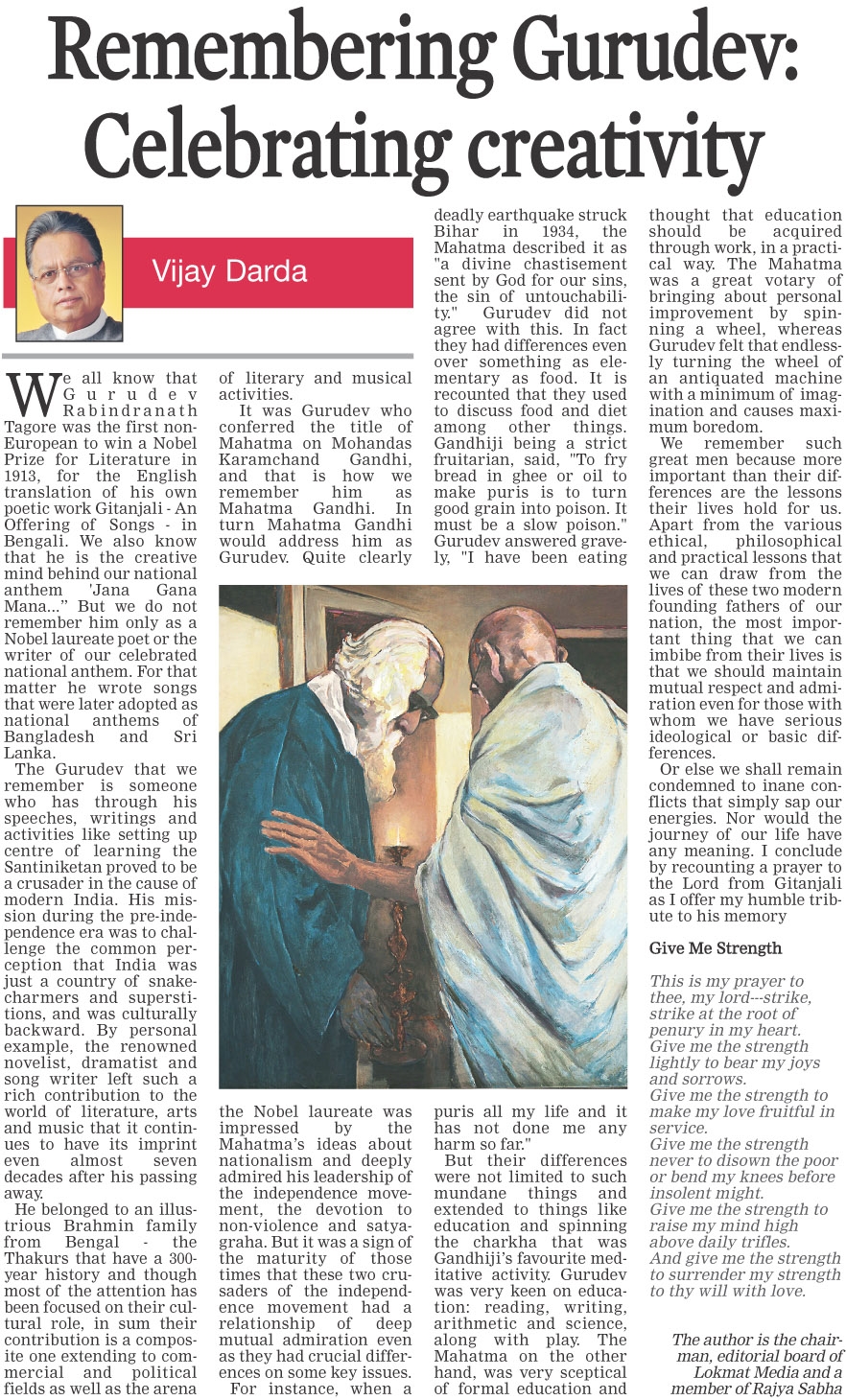Remembering Gurudev: Celebrating creativity
 By Vijay Darda | 07-05-2016
By Vijay Darda | 07-05-2016
We all know that Gurudev Rabindranath Tagore was the first non-European to win a Nobel Prize for Literature in 1913, for the English translation of his own poetic work Gitanjali – An Offering of Songs – in Bengali. We also know that he is the creative mind behind our national anthem ‘Jana Gana Mana…” But we do not remember him only as a Nobel laureate poet or the writer of our celebrated national anthem. For that matter he wrote songs that were later adopted as national anthems of Bangladesh and Sri Lanka.
The Gurudev that we remember is someone who has through his speeches, writings and activities like setting up centre of learning the Santiniketan proved to be a crusader in the cause of modern India. His mission during the pre-independence era was to challenge the common perception that India was just a country of snake-charmers and superstitions, and was culturally backward. By personal example, the renowned novelist, dramatist and song writer left such a rich contribution to the world of literature, arts and music that it continues to have its imprint even almost seven decades after his passing away.
He belonged to an illustrious Brahmin family from Bengal – the Thakurs that have a 300-year history and though most of the attention has been focused on their cultural role, in sum their contribution is a composite one extending to commercial and political fields as well as the arena of literary and musical activities.
It was Gurudev who conferred the title of Mahatma on Mohandas Karamchand Gandhi, and that is how we remember him as Mahatma Gandhi. In turn Mahatma Gandhi would address him as Gurudev. Quite clearly the Nobel laureate was impressed by the Mahatma’s ideas about nationalism and deeply admired his leadership of the independence movement, the devotion to non-violence and satyagraha. But it was a sign of the maturity of those times that these two crusaders of the independence movement had a relationship of deep mutual admiration even as they had crucial differences on some key issues.
For instance, when a deadly earthquake struck Bihar in 1934, the Mahatma described it as “a divine chastisement sent by God for our sins, the sin of untouchability.” Gurudev did not agree with this. In fact they had differences even over something as elementary as food. It is recounted that they used to discuss food and diet among other things. Gandhiji being a strict fruitarian, said, “To fry bread in ghee or oil to make puris is to turn good grain into poison. It must be a slow poison.” Gurudev answered gravely, “I have been eating puris all my life and it has not done me any harm so far.”
But their differences were not limited to such mundane things and extended to things like education and spinning the charkha that was Gandhiji’s favourite meditative activity. Gurudev was very keen on education: reading, writing, arithmetic and science, along with play. The Mahatma on the other hand, was very sceptical of formal education and thought that education should be acquired through work, in a practical way. The Mahatma was a great votary of bringing about personal improvement by spinning a wheel, whereas Gurudev felt that endlessly turning the wheel of an antiquated machine with a minimum of imagination and causes maximum boredom.
We remember such great men because more important than their differences are the lessons their lives hold for us. Apart from the various ethical, philosophical and practical lessons that we can draw from the lives of these two modern founding fathers of our nation, the most important thing that we can imbibe from their lives is that we should maintain mutual respect and admiration even for those with whom we have serious ideological or basic differences.
Or else we shall remain condemned to inane conflicts that simply sap our energies. Nor would the journey of our life have any meaning. I conclude by recounting a prayer to the Lord from Gitanjali as I offer my humble tribute to his memory
Give Me Strength
This is my prayer to thee, my lord—strike,
strike at the root of penury in my heart.
Give me the strength lightly to bear my joys and sorrows.
Give me the strength to make my love fruitful in service.
Give me the strength never to disown the poor
or bend my knees before insolent might.
Give me the strength to raise my mind high above daily trifles.
And give me the strength to surrender my strength to thy will with love.
Relevant Articles
Neither victory nor defeat, let communal harmony prevail
Nobel lessons for India-Pakistan
As Big B goes on getting bigger
